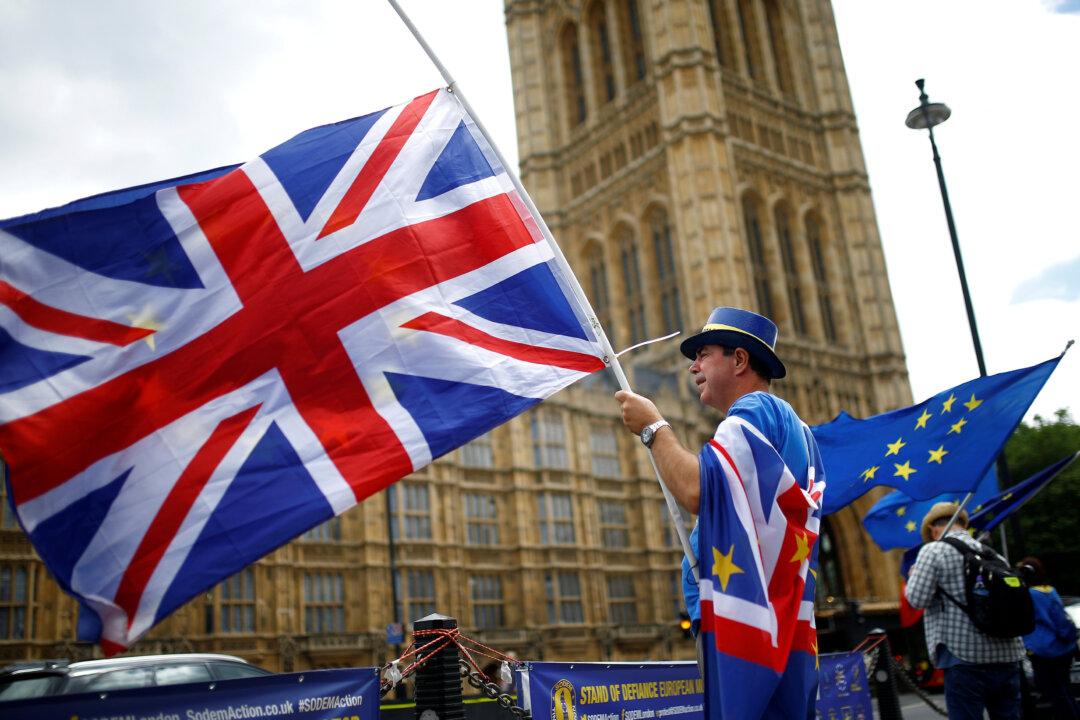A new report urging the UK government to rethink its China policy was launched by The Conservative Party Human Rights Commission on Tuesday.
The report, called “The Darkest Moment: The Crackdown on Human Rights in China 2013–2016”, focuses on the “unprecedented crackdown” on human rights since Xi Jinping’s leadership and outlines 22 recommendations for the UK government.
For many, Britain’s trading relationship with China is perhaps particularly pertinent as it gears up to – albeit slowly – exit the EU.
The report is critical of the current policy and states that the UK should ensure that human rights are “a central focus” to continued engagements with China.
Lord Patten of Barnes, Governor of Hong Kong between 1992 and 1997, said at the launch that it is important to “demolish the absurd argument” that the only way to trade with China is by kowtowing to them.
“When I was governor of Hong Kong I was regularly told trying to stand up for Hong Kong was bad for business. Actually, if you look at the figures, our exports to China during that period went up substantially,” he said.
Lord Patten said that government dialogues on human rights issues need to be given due weight.
“The idea that by treating human rights abuses as a sort of rather nervous postscript to a conversation, so when you are drifting out the door you say: ‘By the way foreign minister did you know there is a certain amount of concern in my country about human rights abuses, I hope you can look at it’ – phew, I’ve said it, I can tell the press I said it. That’s a pretty weasely way of dealing with what is a very, very important subject,” he said.

Vice-Chair of the Commission Benedict Rogers gave the example of German Chancellor Angela Merkel, who has consistently spoken out more than the British government on human rights in China.
“Germany is a good example, where you can do good trade [with China] and speak out and not kowtow,” he said.
“One thing that concerns me is that there may be some who say, because we voted to leave the European Union we need to strengthen our ties with other markets around the world. So all the more reason why we need to be increasing our trade and engagement with China, and therefore we need to kowtow more.
“Yes, we can strengthen our trade relationship with China, but to do so without kowtowing, and to do so speaking out on human rights.”
Lord Patten recalled that during the Soviet Union era, Soviet dissidents who had been imprisoned told him regularly that their conditions improved when Western governments raised their cases with Soviet authorities. The same is true with Chinese dissidents, he said.
“The Darkest Moment” received evidence from more than 30 individuals and organisations, including Joshua Wong, leader of the Umbrella movement in Hong Kong, Chen Guangcheng, the award-winning blind human rights activist, and Angela Gui, daughter of Gui Minhai, one of the missing Hong Kong booksellers.
Gui Minhai is a Swedish citizen and disappeared mysteriously around the same time as four other publishers, including British citizen Lee Po. They sold books that were critical of the Chinese regime in Hong Kong. Gui Minhai was on holiday in Thailand in October 2015 when he was allegedly abducted.
“That was the last time my father was seen before he was paraded on Chinese state controlled TV, after 3 months of silence.
“On TV he said he came back to China voluntarily to hand himself in for a crime – the news channel claimed – that he had committed 13 years ago,” said Angela Gui.
Eight months later and Angela Gui hasn’t received any explanation of why he was detained without charge for 3 months. He still remains in Chinese custody today.
“Knowing my father very well I was convinced that his so called confession was coerced, but I'd not had any proof until my father’s colleague, Lam Wing-kee, was released. He made the courageous decision to tell the truth, Lam told the media that they were given a script to memorise before his TV appearance, that he was held in solitary confinement for months to the point of contemplating suicide.”
“Britain has to insist on answers from the Chinese government regarding this cross-border abduction and the illegal detention of my father and his colleagues, especially as one was a British citizen from Hong Kong. It means it is a serious breach of the Sino-British joint declaration,” she said.
She added: “Nobody should have to live in fear of kidnapping and illegal detention because of their illegitimate trade in books.”
The report highlights the continued detention of dissidents, bloggers and journalists in China, detention and harassment of human rights lawyers, the abduction and detention of booksellers from Hong Kong, the increased repression of the media, forced organ harvesting, the use of televised forced confessions, the ongoing repression in Tibet, and the deteriorating political situation in Hong Kong.
Anastasia Lin, the Chinese-born winner of Miss World Canada who was banned from China because of her human rights work, was at the launch and gave evidence to the report. Her father in China started receiving threats after she won the title.
“Changes must come from China one day and it must come from within,” she said. “It’s true that Chinese people have to initiate the change. One day when the Chinese people are finally free to confront the crimes of the communist party, I hope they don’t have to blame us for complicity.”
Lin is an actress and just won a Leo Award for Best Leading Actress for her portrayal of a victim of persecution in China in the film The Bleeding Edge, which is about the killing of Falun Gong prisoners of conscience in China for their organs.
Researchers have found that practitioners of Falun Gong – a traditional Chinese practice of the Buddha school that was banned in China in 1999 – are the main source of forced organ harvesting in China.
A report published on June 22 this year called “Bloody Harvest/The Slaughter: An Update“ estimates that China has done between 60,000 to 100,000 transplants per year since 2000 – compared with China’s ”official statistics", which are 10,000 to 20,000 per year.
The Commission, which is independent of both the government and the Conservative Party, will be looking into organ harvesting in China and other parts of the world as a separate study in the near future, “The Darkest Moment” report confirmed.
The plight of Falun Gong practitioners has left countless orphans homeless in China, according to teenagers who organised a global bike ride to rescue these children in a project called Ride 2 Freedom. Teenagers highlighted their ongoing efforts to raise awareness during a separate event in Parliament on Wednesday.
At the presentation, Benedict Rogers said: “It is happening on a scale that I think we don’t realise – the persecution of Falun Gong – in killing people for their organs and the orphans who are left without their parents as a result.”
Jim Shannon MP, who sponsored the Ride 2 Freedom talk, said: “The job for us now is to press the government to find if any people travel from here to China for transplants and to stop a disgraceful barbaric and violent surgical practice taking place in China where people don’t willingly donate their organs but they are harvested.”

At the “Darkest Moment” launch, Tim Loughton MP, Chairman of the All Party Parliamentary Group Tibet, highlighted the severe restrictions on human rights faced by those in Tibet, an “Orwellian world of surveillance” with cameras on every street.
People have been jailed for promoting the Tibetan language or for showing support to the Chinese authorities. The “most horrific” he said was the 143 self-immolations of monks, and their families who are prosecuted by Chinese authorities.
Chinese authorities have been known to try to influence British authorities who show any common cause with Tibetans, which he experienced first-hand.
“When I was a minister, the influence from Downing Street to stop me having lunch with the Dalai Lama, which I have had on many occasions, was quite extraordinary,” he said.
A meeting between David Cameron and the Dalai Lama in 2012 upset the Chinese regime, who cut high-level diplomatic ties with Britain. A year later, Cameron agreed not to meet the Dalai Lama again and has since made several trade deals with China.
Lord Patten, who was also former EU commissioner for external affairs, said: “I wish the European Union – I suppose we are still just a part of it – had behaved with a little more common courage, and made it clear to the Chinese authorities, that we’re not ’splitists’, the Dalai Lama isn’t either, that actually European ministers, British ministers, choose who they want to see and what they want to raise, and they don’t have to accept any changes to engagements in their diary.”
In the foreword of the report, Fiona Bruce MP, Chair of the Commission, summed up the spirit of the launch: “Being a friend to China does not mean we resist speaking out when something is wrong. Indeed, being a true friend to the people of China involves the people – and the government – of the United Kingdom speaking up for them.”





